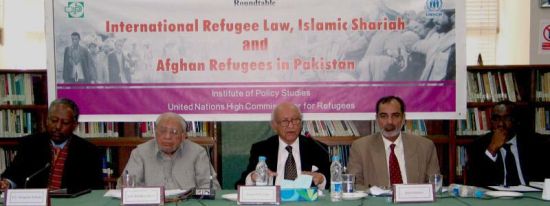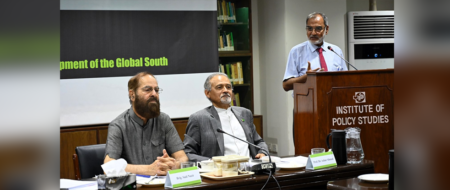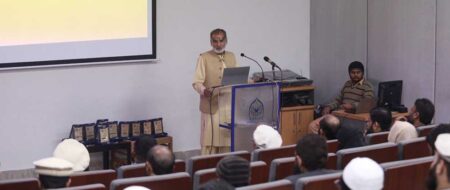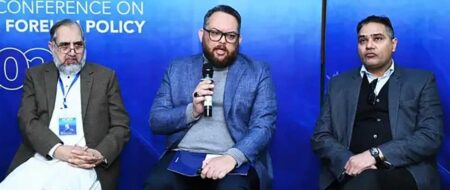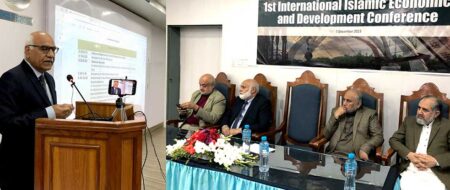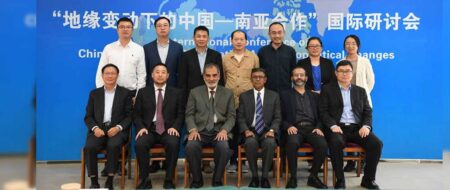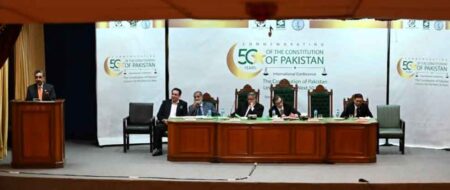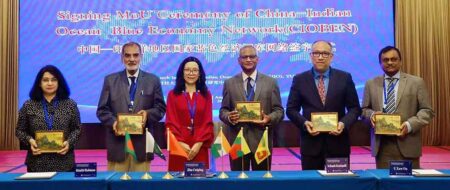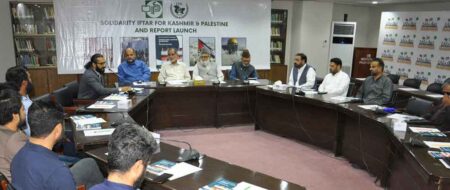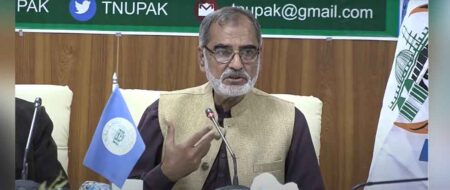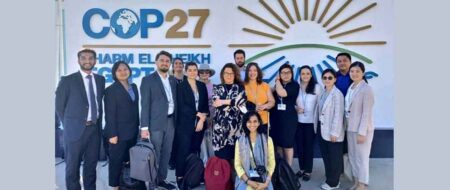In continuation to the earlier efforts regarding the sustainable solution of the refugee issue in general and Afghans in Pakistan in particular, IPS in collaboration with the United Nations High Commission for Refugees (UNHRC) organized a roundtable conference on December 15, 2009.
| Activity: Round Table Conference |
|
Chief Guests:
- Najam-ud-din Khan, Federal Minister for States and Frontier Region (SAFRON)
- Dr. Farooq Sattar, Federal Minister for Overseas Pakistanis
|
| Speaker: |
- Adnan Sarwar Khan, Principal Law College, Peshawar University
- Atle Hetland, Social Scientist, Norway
- Hussain Ahmad Piracha, Prof. IIUI
- Majnoon Ghulab, Afghan Ambassador to Pakistan
- Misbahullah, Prof International Islamic University
- Mustaq Ahmad, Prof at International Islamic University
- Khassim Diague, Deputy Representative UNHCR in Pakistan
- Rustam Shah Mohmand, Ambassador (Retd)
|
- Asad Durrani, Lt. Gen. (Retd) former DG ISI.
- Ayaz Wazir, Ambassador (Retd)
- Khurshid Ahmad, Prof, Chairman, Institute of Policy Studies
- Mengeha Kebede, Representative of UNHCR in Pakistan
- Muhammad Muneer, Prof. at the Department of Shariah, IIUI
- Qutubuddin Hilal, Former deputy Prime Minister Afghanistan
- Saad Muhammad, Brig (Retd.)
- Zhou Rong, Professor
|
|
Chair:
- S. M Zafar, Supreme Court Lawyer and former Law Minister.
- Asad Durrani, Lt Gen (r) Former DG ISI and Ambassador
|

In continuation to the earlier efforts regarding the sustainable solution of the refugee issue in general and Afghans in Pakistan in particular, IPS in collaboration with the United Nations High Commission for Refugees (UNHRC) organized a roundtable conference on December 15, 2009.
The roundtable consisted of Inaugural and two Working Sessions. A cross-section of stakeholders hailing from Afghan Refugees, the government of Pakistan and Afghanistan, NGOs experts, lawyers, journalists and diplomats discussed the common grounds between International refugee law and Shariah, various dimensions of Afghan Refugee issue in Pakistan and the viable recommendations.

Opening the Inaugural Session, DG IPS Khalid Rahman highlighted the significance of the asylum seeking in the present day world saying when a large number of people from various parts of the world had been displaced for the last many years due to conflicts and natural disasters, it was high time to discuss options and choices for improving existing legal framework to minimize the agony and misery of the asylum seekers and refugees in the world.
Islamic guidance towards the issue of refugees and asylum seekers could help improve the international refugee law and formulate a workable legal framework, he suggested.
UNHCR deputy representative Khassim Diagne said there was no contradiction between the mandate of UNHCR and Islamic traditions as all the key concepts of Sharia are found in modern international refugee law. “Protection of refugees, civilian character of asylum, voluntary repatriation and safety and dignity of the refugees are referred in Quran and Sunnah,” he maintained.

Introducing the recent study jointly published by UNHCR, Organization of Islamic Conference (OIC) and Naif Arab University for Security Sciences titled “Right to Asylum between Islamic Shari’ah and International Refugee Law: A Comparative Study,” he noted, “Pakistan is the right country to launch this book as Pakistan is the largest Muslim refugees-hosting country in the world besides, quartering over two million Internally Displaced Persons (IDPs) due to the crisis.”
Quoting from the book, he said “Islam’s 1400-year-old tradition of generosity toward people fleeing persecution has had more influence on modern-day international refugee law than any other historical source and international refugee law was not the creation of the West but it is based on Islamic and Arab traditions coupled with the ancient principles of hospitality and protection.”
Federal Minister Najm ud Din Khan stated despite the fact that Pakistan was not a signatory to 1951 convention on refugees, it had been housing 4.4 million refugees for three decades as “we considered it a religious duty because refugees are our brothers and sisters in Islam”.

He said the government of Pakistan needed persistent and generous support of its international partners especially UNHCR to meet the challenges faced by the refugees and address the miseries of millions of internally and externally displaced persons in the country.
Discussing the security implications of Afghan refugees, Dr. Farooq Sattar said “Although large number of criminals and drug traffickers belong to the refugees or religious groups, the whole community cannot be held responsible for this.”
Dr. Sattar underscored the need for evolving a comprehensive policy for managing and repatriating the refugees, adding that better and effective assistance could only be granted to the unfortunate migrants if local population and their representatives are involved in the process.

The representative of UNHCR in Pakistan, Mengeha Kebede apprised the audience about the efforts of benefiting from the provisions and guidelines of Islamic Sharia towards rights and duties of refugees and asylum seekers. “Islam is more compassionate and accommodative for the refugees than contemporary international regime for the care and protection of refugees.” he added.
He recommended that UNHCR as well as the governments of Pakistan and Afghanistan should jointly formulate a legal framework in order to deal with this humanitarian issue besides improving the management of the borders and cross border movement of the people.

Mr. Kebede also explained the forced migration of the refugees was practically stopped due to the chilly weather.
Charge de Affairs of the Embassy of the Islamic Republic of Afghanistan in Islamabad, Majnoon Ghulab thanked Pakistan’s unprecedented hospitality and affection provided to the refugees in Pakistan. Discussing the problems faced by Afghan refugees due to distorted image in media, he said Afghan nationals were arrested but in majority of the cases they were released after the investigation.

Presenting an in-depth comparison of International modern refugee law and Islamic law, Prof. Muhammad Muneer identified various limitations in the former which, he argued, can be filled by incorporating the principles of Islamic law, adding it would make the modern law far more protective for refuges.
Dr. S M Zafar, chairing the Inaugural Session, stressing upon the need to define ‘refugee’ more precisely and clearly and to improve the international refugee law, argued that Islam should be judged by its principles and ethos and not by its followers.

Rustam Shah Mohmand, in his speech, dispelled the impressions that Afghans were not willing to return to their country and they were involved in the various crimes in the country, maintaining, “80 per cent of Afghan refugees want to return but the volatility in Afghanistan keeps them from going back. There are very few instances of the organized crimes associated with any refugee camp in Pakistan.”
Dr. Adnan Sarwar suggested developing complementary approach and instead of contrastive one while synchronizing the international refugee law with Islamic Sharia.

Ayaz Wazir said that the Afghan refugees could become good-will ambassadors for Pakistan if they were treated with respect and honor.
Asad Durrani, chairing the Second Session of the conference, said that Pakistan’s policy towards the refugees and the administration of refugee affairs was ideal but the developments in the wake of 9/11 had complicated the issue for Pakistan.
Participating in the general discussion, the representatives of Afghans refugees expressed their gratitude to the people as well as government of Pakistan while complaining the maltreatment of Afghan nationals by police and law enforcing agencies. They stressed that proper legislation should be put in place to streamline the whole issue.

Other intellectuals and analysts present in the roundtable asked for seeking durable solutions to the problems that are faced by humanity today by preventing conflicts and wars and on the same time helping and assisting the displaced persons uprooted by such and other causes. They expressed their disappointment particularly for the Muslim states in failing to give effect to excellent framework given by Islam on the subject of hijra [migration].
Concluding the session, Chairman IPS, Prof. Khurshid Ahmad noted that the process of dialogue and debate was a continuous process which should be pursued in order to reach solutions of such issues.

Prof. Khurshid maintained that peace could not prevail in the region unless foreign intervention comes to an end particularly in Afghanistan. “The international powers have adopted the war methods to deal with the crimes instead of treating the crimes with the established principles of law and justice. This attitude is destroying the global peace.” He asked the government of Pakistan to seriously consider the accession to international convention on refugees and incorporate Islamic principles relating to hijra in its policy.
Wrapping up the session, he maintained that Afghans in Pakistan are presumed guilty until proven innocent. “Treating Afghans with affection, patience and love shall make them goodwill ambassadors for Pakistan and the opposite will amount to serious moral and strategic mistake,” he concluded.
 In continuation to the earlier efforts regarding the sustainable solution of the refugee issue in general and Afghans in Pakistan in particular, IPS in collaboration with the United Nations High Commission for Refugees (UNHRC) organized a roundtable conference on December 15, 2009.
In continuation to the earlier efforts regarding the sustainable solution of the refugee issue in general and Afghans in Pakistan in particular, IPS in collaboration with the United Nations High Commission for Refugees (UNHRC) organized a roundtable conference on December 15, 2009. Opening the Inaugural Session, DG IPS Khalid Rahman highlighted the significance of the asylum seeking in the present day world saying when a large number of people from various parts of the world had been displaced for the last many years due to conflicts and natural disasters, it was high time to discuss options and choices for improving existing legal framework to minimize the agony and misery of the asylum seekers and refugees in the world.
Opening the Inaugural Session, DG IPS Khalid Rahman highlighted the significance of the asylum seeking in the present day world saying when a large number of people from various parts of the world had been displaced for the last many years due to conflicts and natural disasters, it was high time to discuss options and choices for improving existing legal framework to minimize the agony and misery of the asylum seekers and refugees in the world. Introducing the recent study jointly published by UNHCR, Organization of Islamic Conference (OIC) and Naif Arab University for Security Sciences titled “Right to Asylum between Islamic Shari’ah and International Refugee Law: A Comparative Study,” he noted, “Pakistan is the right country to launch this book as Pakistan is the largest Muslim refugees-hosting country in the world besides, quartering over two million Internally Displaced Persons (IDPs) due to the crisis.”
Introducing the recent study jointly published by UNHCR, Organization of Islamic Conference (OIC) and Naif Arab University for Security Sciences titled “Right to Asylum between Islamic Shari’ah and International Refugee Law: A Comparative Study,” he noted, “Pakistan is the right country to launch this book as Pakistan is the largest Muslim refugees-hosting country in the world besides, quartering over two million Internally Displaced Persons (IDPs) due to the crisis.” He said the government of Pakistan needed persistent and generous support of its international partners especially UNHCR to meet the challenges faced by the refugees and address the miseries of millions of internally and externally displaced persons in the country.
He said the government of Pakistan needed persistent and generous support of its international partners especially UNHCR to meet the challenges faced by the refugees and address the miseries of millions of internally and externally displaced persons in the country. The representative of UNHCR in Pakistan, Mengeha Kebede apprised the audience about the efforts of benefiting from the provisions and guidelines of Islamic Sharia towards rights and duties of refugees and asylum seekers. “Islam is more compassionate and accommodative for the refugees than contemporary international regime for the care and protection of refugees.” he added.
The representative of UNHCR in Pakistan, Mengeha Kebede apprised the audience about the efforts of benefiting from the provisions and guidelines of Islamic Sharia towards rights and duties of refugees and asylum seekers. “Islam is more compassionate and accommodative for the refugees than contemporary international regime for the care and protection of refugees.” he added. Mr. Kebede also explained the forced migration of the refugees was practically stopped due to the chilly weather.
Mr. Kebede also explained the forced migration of the refugees was practically stopped due to the chilly weather. Presenting an in-depth comparison of International modern refugee law and Islamic law, Prof. Muhammad Muneer identified various limitations in the former which, he argued, can be filled by incorporating the principles of Islamic law, adding it would make the modern law far more protective for refuges.
Presenting an in-depth comparison of International modern refugee law and Islamic law, Prof. Muhammad Muneer identified various limitations in the former which, he argued, can be filled by incorporating the principles of Islamic law, adding it would make the modern law far more protective for refuges. Rustam Shah Mohmand, in his speech, dispelled the impressions that Afghans were not willing to return to their country and they were involved in the various crimes in the country, maintaining, “80 per cent of Afghan refugees want to return but the volatility in Afghanistan keeps them from going back. There are very few instances of the organized crimes associated with any refugee camp in Pakistan.”
Rustam Shah Mohmand, in his speech, dispelled the impressions that Afghans were not willing to return to their country and they were involved in the various crimes in the country, maintaining, “80 per cent of Afghan refugees want to return but the volatility in Afghanistan keeps them from going back. There are very few instances of the organized crimes associated with any refugee camp in Pakistan.” Ayaz Wazir said that the Afghan refugees could become good-will ambassadors for Pakistan if they were treated with respect and honor.
Ayaz Wazir said that the Afghan refugees could become good-will ambassadors for Pakistan if they were treated with respect and honor. Other intellectuals and analysts present in the roundtable asked for seeking durable solutions to the problems that are faced by humanity today by preventing conflicts and wars and on the same time helping and assisting the displaced persons uprooted by such and other causes. They expressed their disappointment particularly for the Muslim states in failing to give effect to excellent framework given by Islam on the subject of hijra [migration].
Other intellectuals and analysts present in the roundtable asked for seeking durable solutions to the problems that are faced by humanity today by preventing conflicts and wars and on the same time helping and assisting the displaced persons uprooted by such and other causes. They expressed their disappointment particularly for the Muslim states in failing to give effect to excellent framework given by Islam on the subject of hijra [migration]. Prof. Khurshid maintained that peace could not prevail in the region unless foreign intervention comes to an end particularly in Afghanistan. “The international powers have adopted the war methods to deal with the crimes instead of treating the crimes with the established principles of law and justice. This attitude is destroying the global peace.” He asked the government of Pakistan to seriously consider the accession to international convention on refugees and incorporate Islamic principles relating to hijra in its policy.
Prof. Khurshid maintained that peace could not prevail in the region unless foreign intervention comes to an end particularly in Afghanistan. “The international powers have adopted the war methods to deal with the crimes instead of treating the crimes with the established principles of law and justice. This attitude is destroying the global peace.” He asked the government of Pakistan to seriously consider the accession to international convention on refugees and incorporate Islamic principles relating to hijra in its policy.




